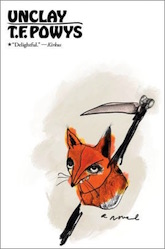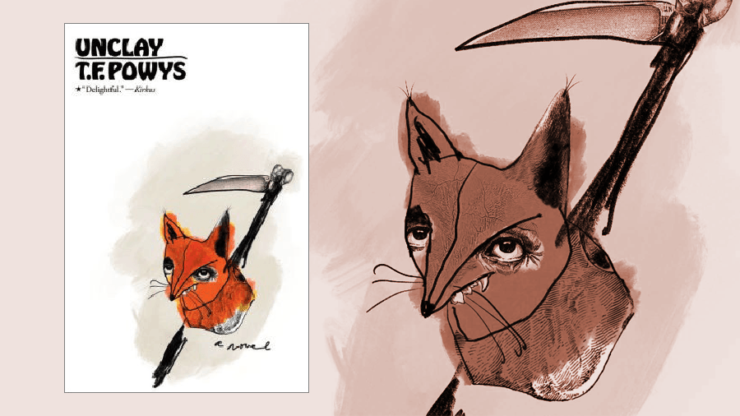T.F. Powys’s novel Unclay holds the unwelcome distinction of being triply obscure. The first level of obscurity: you’re vanishingly unlikely to meet anyone who knows of an author named Powys—I’ve met three, and two were publishers of authors named Powys. The second level: those who know the name are most likely thinking of John Cowper Powys, elder brother to Theodore Francis. The final level: most everyone who has heard tell of, or even read, Powys, knows only his 1927 allegorical fantasy Mr. Weston’s Good Wine. Unclay, the final novel Powys published in his lifetime, last received an American issue in 1932, four years before Harvard underclassman and steel heir James Laughlin published the first title under the New Directions banner. Eighty-six years on from its last appearance in the US, New Directions has revived Unclay.
I’m not sure how or where they found it, but I’m glad they did: this book deserves to be in print.
Jorge Luis Borges was one of Powys’s few readers, and a blurb from the great Argentine receives pride of place on this reissue. I suppose it’s not a surprise—Borges read more after losing his vision than most of us do in our entire sighted lives—but Unclay is such an odd and unlikely book that it seems scarcely more real than the fictional books he delighted in, as if it were a volume plucked at random from the Library of Babel or a chance entry from the encyclopedia of Tlön.
The plot is halting and allegorical. Mr. Hayhoe, a vicar whose love of God is matched only by his admiration for Jane Austen, meets a laborer in a lane outside the sleepy country town of Dodder. This laborer, a Mr. Death, is looking for a lost parchment, the contents of which he has forgotten, which describes the work he must perform in Dodder. Although Death makes few attempts to disguise that he is, in fact, the reaper, Mr. Hayhoe, less perspicacious than his beloved Miss Austen, never does quite realize the identity of his conversation partner.
Death, unable to find the work order with the names of the two people he must “unclay” and return to dust, decides to spend his summer in the village. He experiences sex and lust and love, in that order, and he learns what people are like before their last moments. Dodder offers many lessons about humanity, for the village has all the essential stock figures. Without exception, each villager falls into at least one of two categories: allegorical or eccentric. One woman believes herself to be a camel; one man is so afraid of Love (often capitalized) that he has trained his eyes not to see women. The villages boasts a meddling gossipy storekeeper, an archetypal miser, a quintessential sadist, a lovely virgin, and a good-hearted strumpet.
For all the types and stock figures who populate Dodder, Powys’s book is sui generis. His theology mixes reverence and suspicion in equal measure; A.N. Wilson couldn’t decide if an earlier Powys novel was “religious” or “anti-religious,” and readers of Unclay will face a similar quandary. And then there’s the matter of his language, which oscillates between earthy virility and elevated abstraction, sometimes in the same sentence. Similarly, a character might hold quite regular conversations with his neighbors, before attempting rhetorical flights. Here, for example, is Mr. Solly, believer in nuts and disbeliever in women: “All things must go the way of nature. The oldest gods, that moved first in the still waters, must ever rule. Until the seas again become the void, until the hills are emptied into the bowl of eternal darkness, the pains of love must continue.” Mr. Solly, incidentally, concludes the book affianced to a nine-year-old sprite, whose hand he will take on her eighteenth birthday. The unreality of the events and the allegorical point almost cancel the hint of pederasty.
Buy the Book


Unclay
Other relationships prove equally disconcerting, for Unclay is a novel about the equal and complementary demands of love and death. Consummation and expiration run together; the “Large Quiet” is an expansion of la petite mort. You cannot spell “unclay” without “lay;” Death, “so wanton[…], a sworn adversary to all decency and decorum” who avers that “I always appear stark naked,” proves quite the lover, and many of Powys’s jokes, and most of his philosophical points, derive from the conflation of eros and thanatos:
They lie in bed and call to me to come to them. Of course I tantalize them a little. One cannot always be potent in an instant when one is wanted. A man so much in request as I has to hold back sometimes. Ah! You think that you alone can make a young maid cry out, but I can do so too, when I come to them. I give them pain for their pennies. Their tortured bodies cry and groan and drip blood because of my sweet embraces.
There’s a lot more where that came from; this novel of rural life overflows with country matters.
Unclay doesn’t seem like a twentieth-century novel; and though it’s a mishmash of tones, styles, and modes, it doesn’t prefigure postmodernism. Its cast of eccentrics might have emerged from Wodehouse, but they speak as ponderously as Milton or the King James Bible and behold visions that owe a debt to Blake. The novel’s theological concerns and earthy humor harken back to Swift, but Powys’s ambivalence on matters religious—Borges aptly labeled Powys “heretical and mocking”—seems distinctly Modern. The novel’s languor seems nineteenth century, its occasional radical terseness—witness the book’s final sentence—seems hyper-contemporary, and its gender politics must surely be antediluvian. Although this book seems to come from no particular time, it certainly comes from a very particular place: With its lunatic lords, cracked barmen, distracted preachers, miserly farmers, and fundamental social cohesion, Dodder belongs to an England more English than its real-life counterpart. Yet Dodder is no prelapsarian ideal, for Powys pays equal attention to the children’s bones at the bottom of the pond, to the sadist beating his dog, to the father peeping on his undressing daughter, to the daily greed and quotidian neglect that mar any arcadia.
By most any conventional criteria, Unclay must count as a failure: too long, too digressive, too schematic, wilfully unbelievable, and dramatically frustrating. Yet Powys somehow obliterates these rational criteria and banishes all of my aesthetic scruples. It may well be the best book of its kind by sake of being the only book of its kind; it never inaugurated a tradition or inspired successors, nor did Powys publish succeeding novels. This novel will never be a popular success, and I suspect that most readers who begin it will not reach its last pages. I’ve said more critical things in this review than ever I included in my harshest pan and I can think of hardly any friends I could recommend it to, yet I loved this book.
Unclay is available from New Directions.
Matt Keeley reads too much and watches too many movies. You can find him on Twitter at @mattkeeley.











Thank you for reviewing this, I will have to check it out. I have been saying lately that readers, listeners, and viewers need to challenge themselves and take chances on works that take us out of our comfort zones, that force us to have at least an internal dialogue or argument with a given work. Much like Cronenberg’s film “A History of Violence” for me – nearly 14 years later and I still cannot decide if I liked the film or hated it. I have watched it many times (hell, I *own* a copy of the DVD) but find it both compelling and repellent. Works that challenge us, push us forward are the ones that can make a decided difference in our lives, and I would say that goes double for people working in creative industries or aspiring to work in creative industries.
Purchased Unclay after reading this post and I am thrilled that I did. Powys’ prose is masterful, he reminds me of an English country version of McCarthy. With so many authors, especially in our favored genre here, falling perilously close to pulp status, Powys is a breath of fresh air.
My only complaint is that I’m having a hard time finding more of his books, other than the aforementioned Mr Weston’s Good Wine.
Thanks Matthew, wonderful recommendation.
I can’t say that I share your enthusiasm for this title though you’ve done a great job of encapsulating it. But I comment here to suggest a book that I *did* love, and that “Unclay” frequently reminded me: Tristram Shandy.
I have just finished this book I came upon by chance and really enjoyed it… fascinating